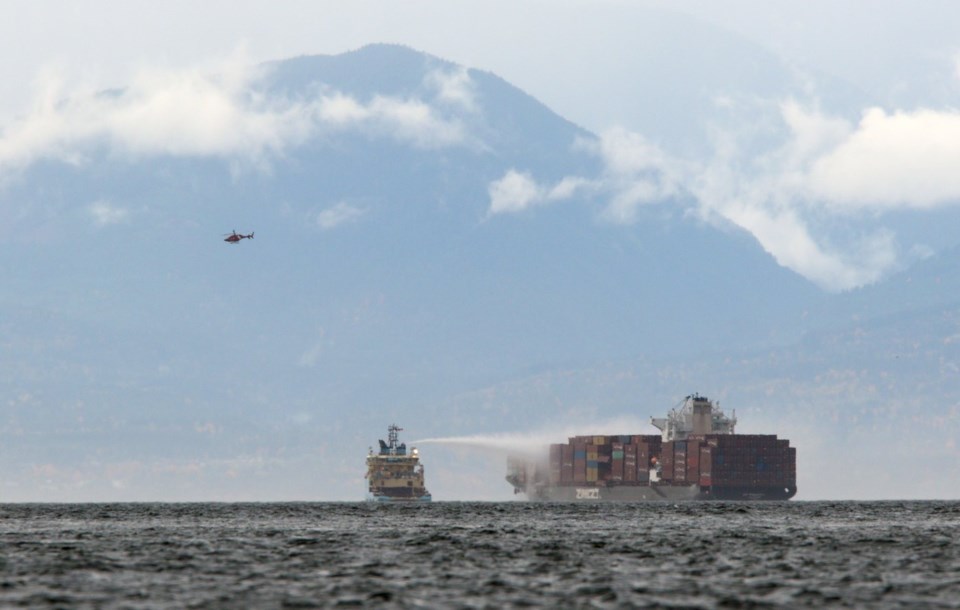VANCOUVER — The chair of Canada's Transportation Safety Board says it was luck rather than preparedness that helped in putting out a fire on a cargo ship off Vancouver Island's coast in October 2021.
Kathy Fox said more urgent and effective action is needed to address marine emergencies in Canadian waters after the MV Zim Kingston spilled more than 100 containers and later caught on fire, leaving hundreds of tonnes of debris that still washes up on shore years later.
"In this occurrence, it was extremely fortunate that the vessel's manager had made pre-arrangements for emergency response and that there happened to be suitably equipped vessels nearby," Fox told reporters in Vancouver Wednesday at the release of the board's report about the emergency.
"It is important not to mistake this luck for emergency preparedness. The next time we might not be as lucky."
The safety board report says that while the federal government is working on a number of potential improvements, those are years away and meanwhile gaps in Canada's preparedness for marine emergencies could pose a risk to vessels, the environment, and the health and safety of the public.
The board’s report says the incident “raised questions about the availability and capability of Canadian resources” in emergencies.
Fox said it is estimated that 1,490 tonnes of cargo was lost overboard in 109 containers, only four of which have been recovered. She said 97 per cent of the debris remains in the waters or washed up in the coastline.
"The loss of a container can take seconds, but years later damage remains,” she said.
Less than two days after the containers fell from the ship and while the vessel was anchored off Victoria, a fire broke out in a container that had dangerous potassium amyl xanthate, which then spread to other cargo.
The fire burned for five days.
The safety board’s report says Canada does not have a plan to respond to events involving noxious substances, other than oil, and it also calls for a comprehensive guide to deal with ships that have rolled, like in this incident.
Unlike the United States, Canada does not require prearranged plans for fire response or marine salvage, and the Canadian Coast Guard does not directly participate in putting out fires.
In the case of the Zim Kingston, because the ship travelled frequently in American waters, it did have a plan and was able to call on two "foreign flagged" vessels with firefighting capabilities to help, said senior investigator Étienne Séguin-Bertrand.
Fox said Canada has the power in the short term to implement regulations that require vessels coming into Canadian waters to have similar prearranged plans.
"So, we think if Canada can implement those regulations sooner then at least it will improve the timeliness of the response," she said.
The report says the Greek-owned ship experienced what’s known as “parametric rolling,” when it tipped 36 degrees, caused by a complex combination of factors involving the sea condition and the vessel.
“Not only is it difficult to predict exactly when a parametric rolling event will occur, but once extreme rolling starts, it may not be possible to stop the dangerous motions before negative consequences occur, such as container loss,” the report says.
It says there needs to be a focus on monitoring for the conditions that give rise to the rolling so that preventive measures can be taken.
The Zim Kingston's owner had not developed procedures to manage the risk of such rolling, the report says.
“As a result, this risk was not being effectively monitored and no mitigation measures were put in place as the vessel held offshore.”
The report says international guidance for addressing the risk of parametric rolling has not been updated in 17 years, and it doesn’t offer policies, procedures, training, tools, or services that might help.
New guidelines have been created, but the safety board says it’s unclear when they will be implemented for existing vessels and they do not address training for the crew.
The safety board's investigation says the Canadian government intends to create a single system to respond to all marine pollution incidents and Transport Canada is developing regulations to strengthen preparedness requirements for the industry.
That includes requiring vessels to have arrangements for firefighting and salvage services, and creating a specialist position for someone who could work with federal departments and others to manage an incident.
The report says the changes could take another four years.
People along the Vancouver Island coastline have pulled debris off the sand for years, including vacuum cleaner parts, bike helmets, coolers and urinal mats, that appear to have come from the Zim Kingston containers.
Transport Canada spokeswoman Sau Sau Liu said in a statement Wednesday that the department was carefully reviewing the safety board's report.
Liu said rules for ships making international voyages include comprehensive safety requirements in areas like ship construction, stability, strength and fire protection.
She said changes to the Canada Shipping Act last year "further strengthen the foundation of marine incident management, including enabling early action to prevent an emergency from happening or getting worse."
This is not the first time concerns about Canada's preparedness have been raised following the Zim Kingston emergency.
A Commons standing committee report released in 2022 made 29 recommendations as it warned that the federal government, provinces and coastal communities were "not operationally prepared" to manage marine cargo container spills.
This report by The Canadian Press was first reported July 31, 2024.
Ashley Joannou, The Canadian Press

